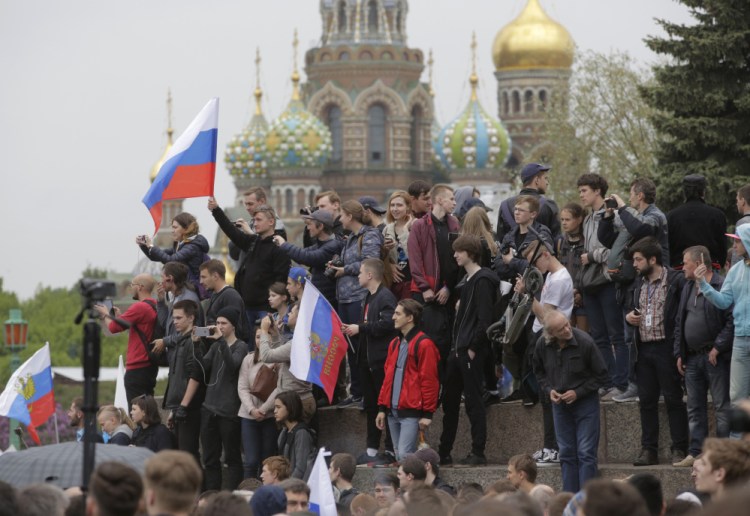Protests in Russia on Monday confirmed a trend that was seen in demonstrations in March – the appearance of a large number of angry young people, including teenagers. Most of them have grown up in a Russia ruled by only one person, President Vladimir Putin, and his placeholder pal, Dmitry Medvedev, who have together been in power for 17 years. The youthful demonstrators said they were fed up with the stagnant authoritarianism that Putin has come to represent. Nikita Orlov, 18, told the New York Times, “I came here because we have no democracy, our Parliament is not real, our politicians are not real and our mass media is not real.”
Putin likes to paint a picture of stability. He has squeezed out all serious competition to his rule and is frequently presented to the public as the embodiment of the Russian state and a leader of unchallenged popularity.
That is precisely why the demonstrations matter. Thousands turned out in Moscow, St. Petersburg and dozens of other Russian cities, summoned to the streets by the anti-corruption blogger Alexei Navalny, who was promptly detained and sentenced to 30 days in jail. More than 1,000 people were also arrested in Moscow and St. Petersburg.
While many came out to support Navalny’s campaign against corruption, in Moscow they were also protesting the city’s demolition of old apartment blocks, among other things. The crowds are a reminder that, despite Putin’s authoritarianism, some Russians want a more democratic and open system and are willing to stand up for their beliefs.
Putin has little use for democracy anywhere – either at home or abroad. In his mind, the West has long interfered in Russia’s affairs by preaching the values of freedom and liberty. He appears to have relished a chance at payback in 2016 through interference with the U.S. election. Of course, he is wrong: In Russia, the West sought to support best practices of democracy and institution-building, not put a thumb on the scale.
Multiple investigations are already probing Putin’s meddling, including the attempt to harm Hillary Clinton’s campaign through malicious hacking. This week, Bloomberg News reported that Russia’s cyberattack on the U.S. electoral system “was far more widespread than has been publicly revealed” and included probes into voter databases and software systems in nearly twice as many states as was previously reported.
President Obama imposed sanctions on Russia in December in response to the electoral intrusions, and a bipartisan group of senators are pressing ahead with new legislation that would give Congress a stronger hand in keeping sanctions in place and would expand them. Sanctions are in general a crude instrument, but this legislation, which the Senate voted Wednesday to advance, promises to send a message to Putin that such interference in the U.S. election is intolerable. It could also deter the Trump administration from lifting sanctions too quickly or in the absence of reciprocal concessions by Moscow.
If Putin is really so sure about his popularity, he should release Navalny from prison and permit a free and open presidential campaign leading up to the scheduled vote in 2018 in which Navalny is allowed to run. Russians shouldn’t have to risk arrest and worse in the streets in order to support a political change.
Send questions/comments to the editors.



Success. Please wait for the page to reload. If the page does not reload within 5 seconds, please refresh the page.
Enter your email and password to access comments.
Hi, to comment on stories you must . This profile is in addition to your subscription and website login.
Already have a commenting profile? .
Invalid username/password.
Please check your email to confirm and complete your registration.
Only subscribers are eligible to post comments. Please subscribe or login first for digital access. Here’s why.
Use the form below to reset your password. When you've submitted your account email, we will send an email with a reset code.